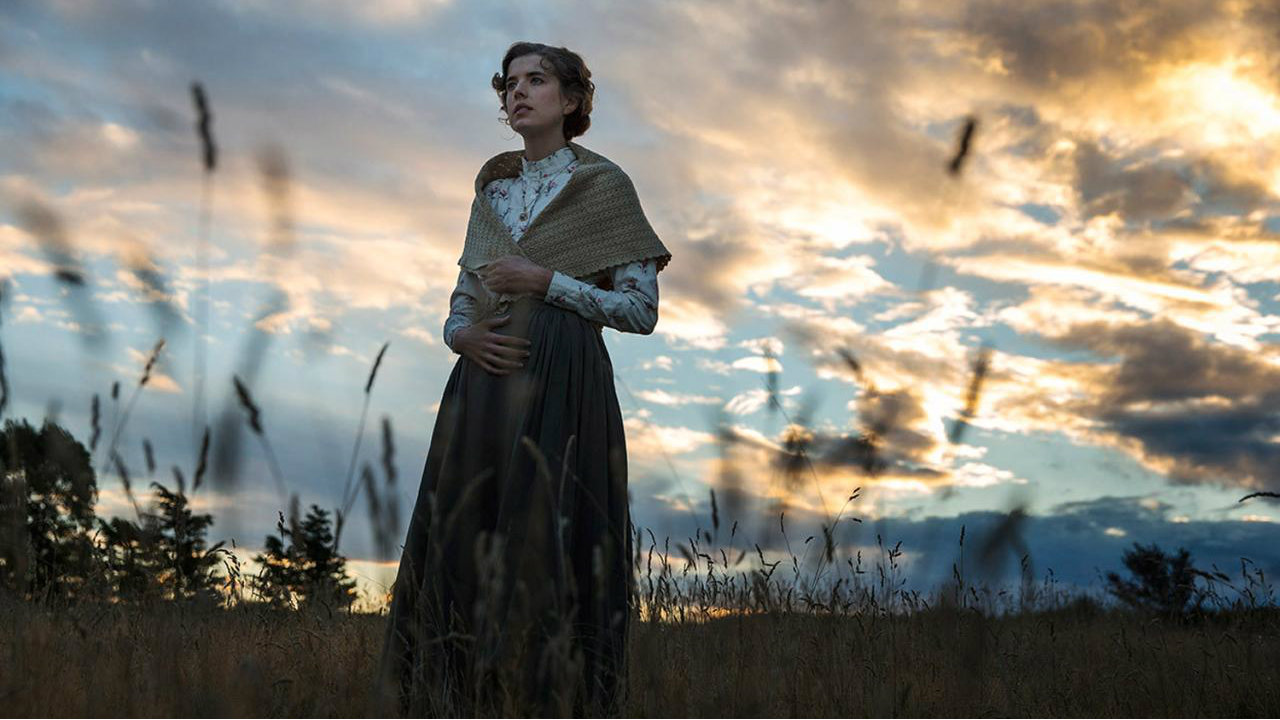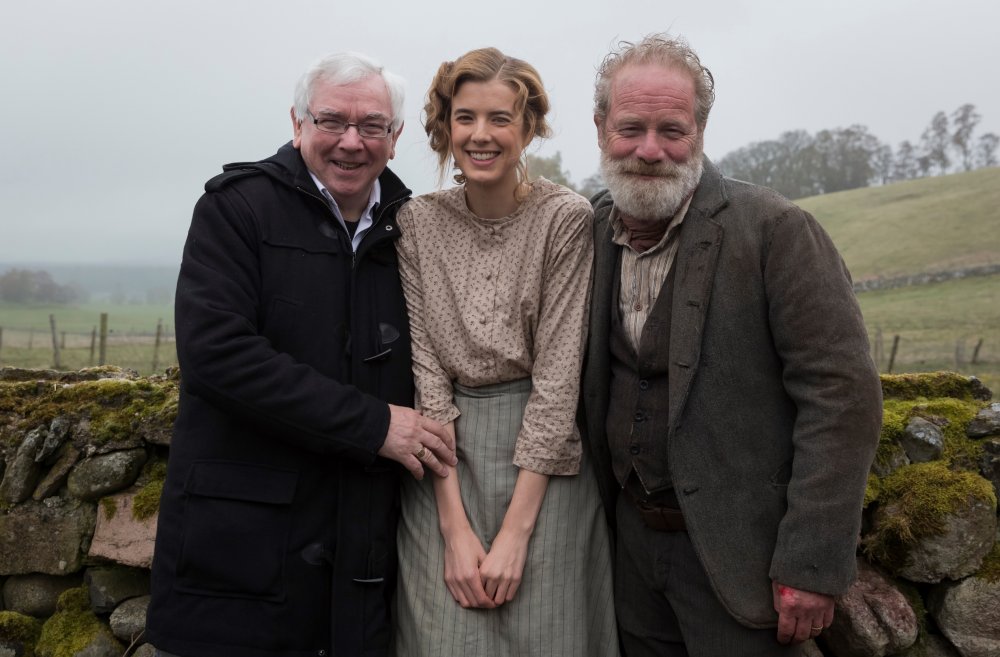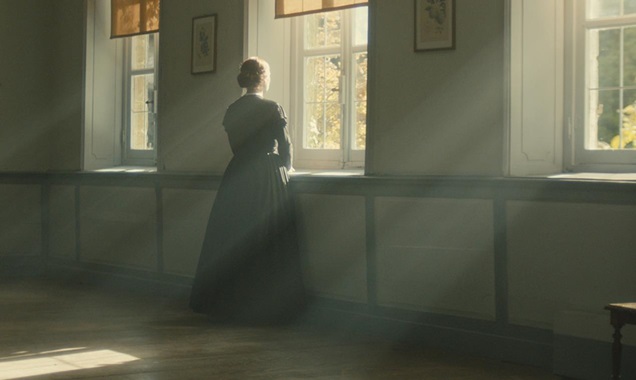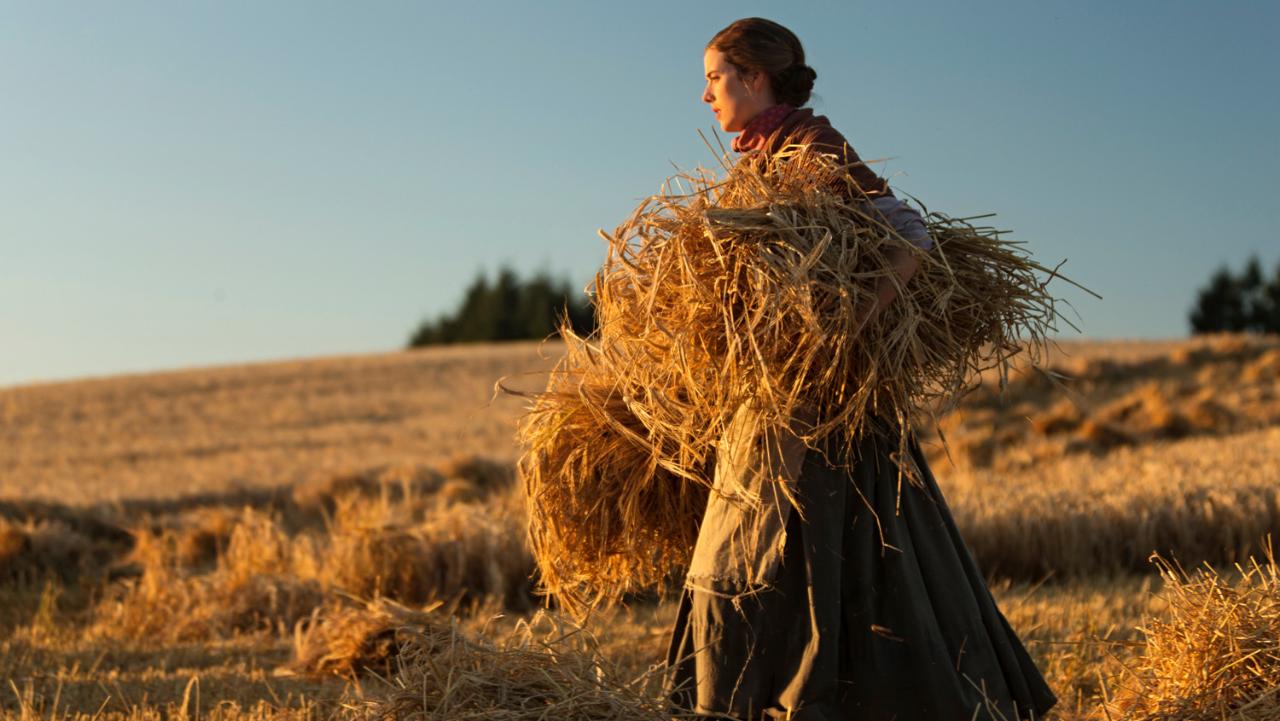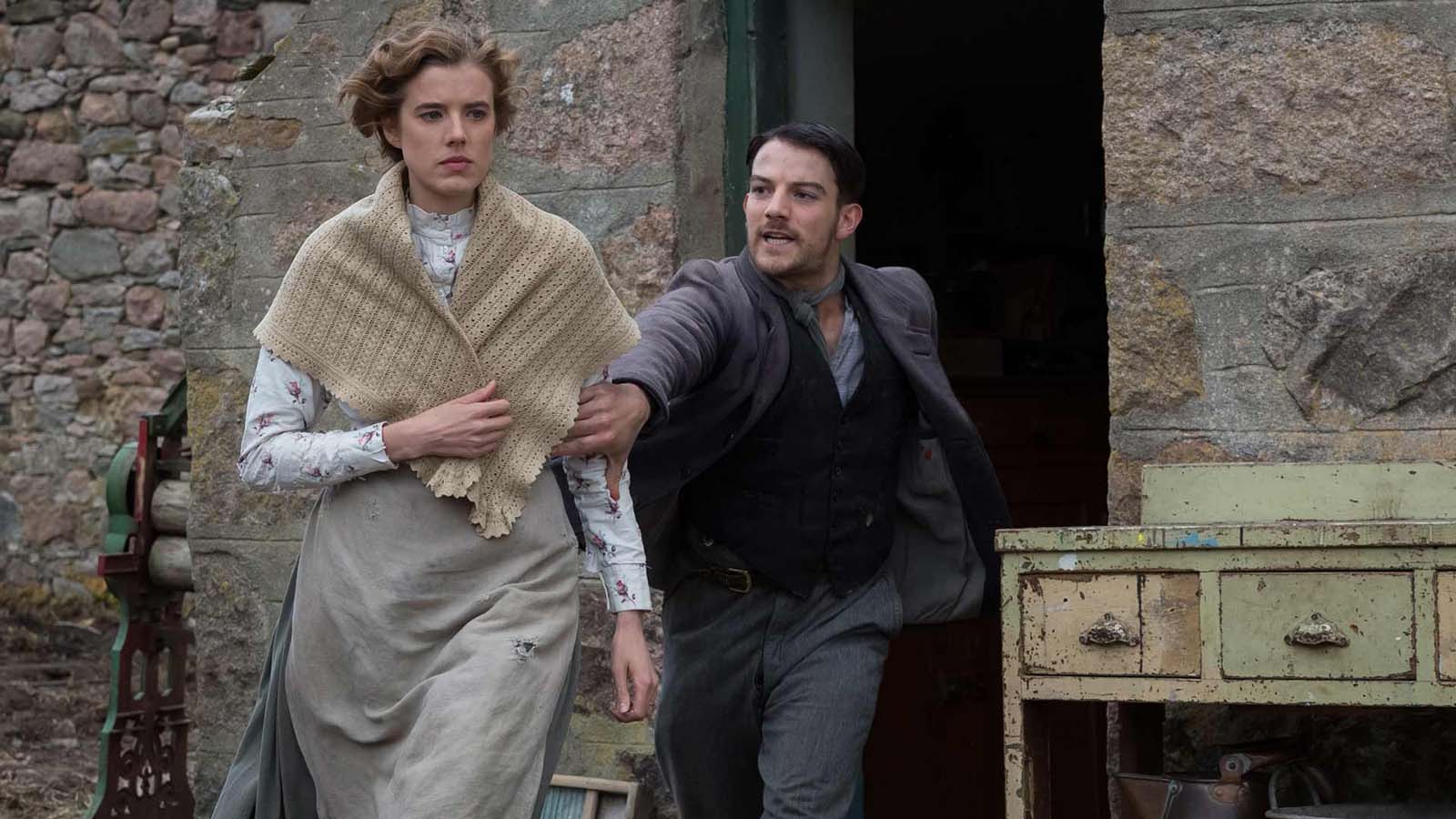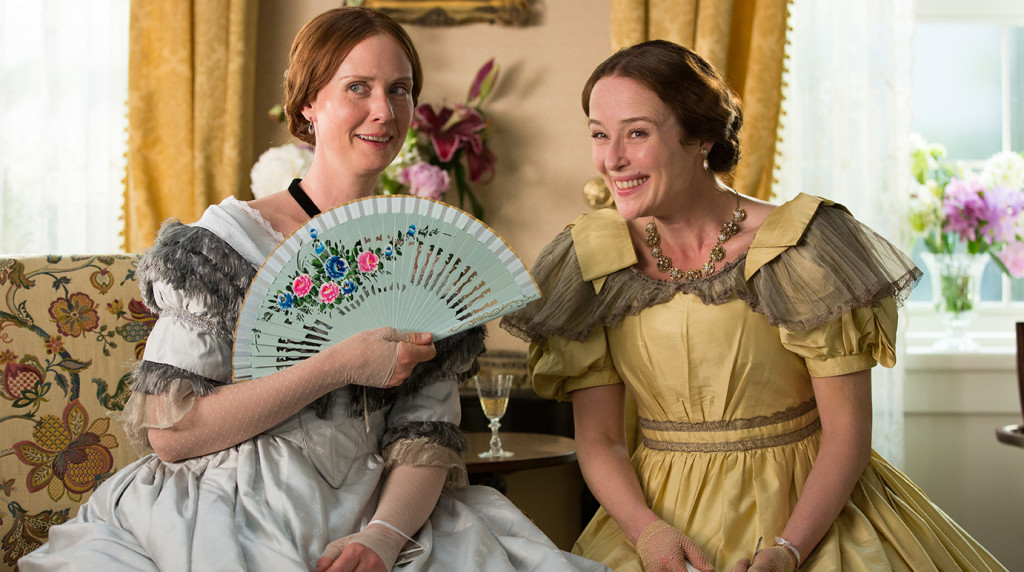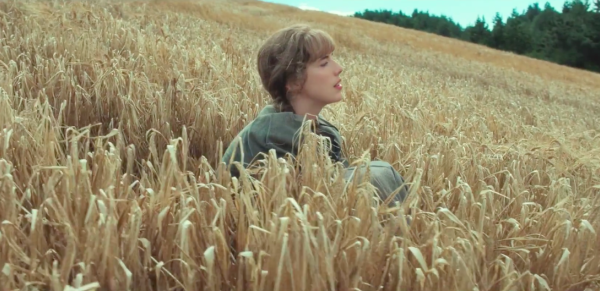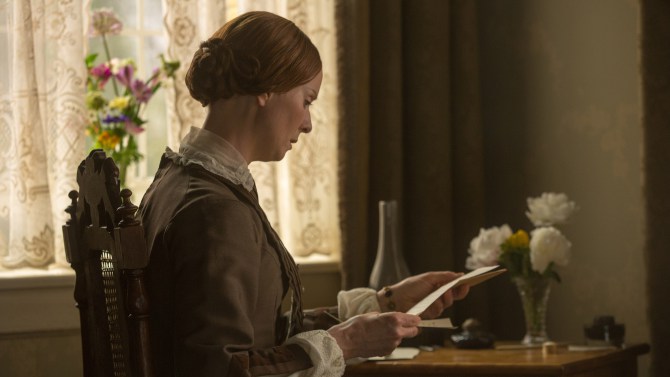Terence Davies is a legend. In his four-decade career, Davies—who was raised in Liverpool in a devout working-class Roman Catholic family, the youngest of ten—has created a body of work like no one else, one that examines memory, family, and place through often startling beauty.

Davies abandoned religion as a teenager, and often grapples with his complicated relationship to the church, tragedy, and sexuality in his movies; he is outright critical of religion.
But his films (including Of Time and the City, The Long Day Closes, and Distant Voices, Still Lives) exude a spiritual sensibility and palpable longing that’s nearly unmatched in contemporary cinema. His camera’s careful attention to small things, like the light streaming through a window or a flickering candle, imbues everyday life with something like holiness.
There’s often large gaps between Davies’s films, due to funding. But this year, he has two out at once. Sunset Song, out in theaters this weekend, is an adaptation of Lewis Grassic Gibbon’s 1932 novel about a young Scottish woman, Chris Guthrie. Chris’s life is marked by both great tragedy and beauty, and critics (including this one) are hailing it as a masterpiece. A Quiet Passion, which premiered at the Berlin Film Festival earlier this year and is still awaiting a U.S. release date, traces the life of Emily Dickinson and her struggles with her faith and her art. (Read our report from the film’s premiere.)
Davies, who speaks warmly and almost musically, spoke with me for forty-five minutes about truth-telling in cinema, shooting light and potatoes, religion, spirituality, and the rich inner life of Emily Dickinson. (He also quoted poetry.) What follows was edited for length and clarity.
Christianity Today: In both Sunset Song and A Quiet Passion, the female protagonists have overtly authoritarian, almost sadistic religious figures hovering over them at the beginning—the father on the one hand in the schoolmarm on the other. Did that similarity strike you at all when you started making the films?
Terence Davies: No. I think I was unconscious. Influences that are unconscious are much more interesting . . . I really did identify with [Dickinson] and I longed for her to be happy. She's yearning for something that will never come. It's heartbreaking, that. She admits, she says, "I've become embittered." That's what happened. What do you do when you actually become the very thing that you dread? Really, when push comes to shove, she's not turned bitter, really.
There's something greater at work there. She's embittered for that moment, but there's something much stronger, and much more spiritual, and much more admirable about her. She cares for other people. She does care about the truth and that.
Did you see that same sensibility in Chris Guthrie as well?
Yes. She's only 14 when [Sunset Song] begins and she's only 21 when it ends. The joy of just being alive, and her friend saying, "Only fools love being alive," which is an extraordinary thing to say. The love of being in the moment, of every moment seeming like a kind of extra thing. Of course, that doesn't exactly doesn't last. It eventually is killed by life. Hopefully you can retain something of that ecstasy as you get older and older. I love the quiet love between her and her brother. It's so quiet. It's so touching. I love that. I just love that.
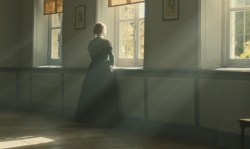
You often shoot the interiors of houses, staircases, light, simple furnishings, plates of food. What’s so interesting about this to you?
I'm obsessed with staircases and people standing at windows. Obviously there something wrong with me. I do love to see a subject standing at a window with light falling on them. I just find it ravishing. I could look at it forever.
. . . Even if you're in a working class environment, there's no reason why that environment shouldn't look beautiful for its own sake. I don't mean just pretty pictures. That, I don't like. . . . Something on the wall, or bread on the side of a table, it's just edible. I love that.
T

his real close attention to the stuff of the place is so important to your work. Is there something behind that for you?
I don't know what is. I can't really explain it. I just know when it's right. I don't know why. There's one shot in Sunset Song, where she pushes a plate of potatoes. . . . They're so simple. But that's what it should be. It's about texture. If the texture's right, you actually feel something ineffable, and it's unconscious.
The film I always quote is a wonderful film made in the the late 40s called It Always Rains on Sunday, set in the east end of London just after the war. The wallpaper in the hall, it is suffocating. Big flowers. You can't breathe, but my God, what it gives you! Subconsciously you actually look at it, you may not be aware of it, but you look at it. Lots of little things that . . . A tin bath on the wall, a pane that's missing and there's some black on . . . those things make it alive, it's got to be alive.
Jane Kenyon wrote a poem about this, called “Dutch Interiors”—it starts with thousands of years of paintings of Christ’s passion, and then shifts to quiet Dutch interior paintings, and she writes, “Now tell me that the Holy Ghost / does not reside in the play of light / on cutlery!”
Do you think a filmmaker can teach an audience how to watch a film? Or does the audience have to bring something to it?
No. You can't do that. You can't say what an audience will like, you can't say what laugh at . . . What you have to do is say, "This is what I saw," and the audience completely act by interpreting what they see. Either for good, or, "I didn't like it, I thought it was too slow, too boring." You can't get inside of them—you just have to hope that they will like it and respond to it.
You have to respond, to cinema, I think, like you respond to music. It's got to be instantaneous and you've got to believe the lie. You've got to believe that because you want to believe it. When things don't work, you think, "I don't believe the lie." As I've said before, it's best to go home, because you sit there thinking, “Another 98 minutes and they still haven't died."

If you were to characterize what it is you really want your viewer to see in a film, what is that?
[long pause] To believe that I've tried to tell the truth.
That may be a boring truth, because I am not everybody's cup of tea, I'm an acquired taste. If it's true, I think any audience responds to truth in whatever area. I just think they do. As I've said before, I made my film with my heart. All I ask is that someone watches it with theirs, and if they don't like it, then they must say it. There's no point in not saying so. That can be very, very hurtful. Very hurtful and disappointing . . .
I was brought up to believe that honesty was the best policy, until a few years ago, someone said something that jolted me: “Sometimes it's better to be kind than to be honest.” Sometimes it is. You've got to think of the other person and know, "I can't say that, I just can't." Or "I can't do that."
I am concerned still, about behaving honorably, because I was brought up to do that. Very often, even if you'd done something wrong you admitted it. When I left school in 1960, it was just a ordinary secondary school. You got a character from the headmaster, and I've still got it at home. In 1961, he said, "This boy is scrupulously honest." I was so proud. I've kept it all these years. Here, Mr. Bush is long dead and that wall is gone, but I do think that it's important to behave honorably.

So if you’re trying to temper truth with kindness, how do you approach your characters? Especially the unlikeable ones.
In a way you have to love them, and you have to try and see why they're like that. Obviously, if someone was unpleasant, that makes it just that much more difficult . . . You have to try and not judge them. It's very difficult, when someone is horrible, when a character is horrible, because you just want to strangle him, but you can't.
You just have to try and be true.
Do you think Emily Dickinson is religious in A Quiet Passion?
I don't think she's religious, I think she's spiritual . . . That's why she swings between the two extremes. Is there a God? Is there not? And what do we do if there isn't? That is so moving because I think this part her, part of me, that wants to believe, "Well yes it's all true. If you do this, this, and this, then you die and you go to God." If you imagine her, sitting on a cloud for eternity, strumming some magical tone on a harmonium . . . Give me hell then. They'll have a much better time down there, and they'll have cocktails as well.

Chris is very spiritual as well in that sense, but her devotion is focused toward the place where she lives.
Yes.
She's in Heaven already.
She says she felt she was the land. She is suffering within, and she's about forgiveness. She represents forgiveness of all suffering. That's what's so magnificent about the ending of that book. You can't read the last two or three pages without weeping. They're heartbreaking . . . At the end, it’s about forgiving.
 V63A0184.CR2
V63A0184.CR2And Dickinson stays home. Her world seems to get smaller on purpose as her life goes on.
You don't have to go all over the world to have an exciting life. The family is the repository of all that is wonderful and terrible. Even in Greek drama, it's basically about family. That's all it's about. She could have not gone anywhere and it doesn't matter. What went on within her, now that's wonderful.
When you're trying to dig into a character whose vastness is inside, how do you bring an audience into that experience?
I don't think of it as vastness. I think of it as richness. Their lives are rich.
There's a composer, now dead, called Michael Tippett. I never liked the music, but he always said, "What you must not do, is starve your inner life." Your inner life has got to be rich.
Her inner life is abundantly rich . . . Why is it rich? Small things give pleasure. When you don't go anywhere, small things give you real pleasure. Mother coming downstairs and she thinks, "Oh she's come down, isn't that lovely?" A tiny thing like that. But it's very big in her life.
Alissa Wilkinson is Christianity Today’s critic at large and an assistant professor of English and humanities at The King’s College in New York City. She is co-author, with Robert Joustra, of How to Survive the Apocalypse: Zombies, Cylons, Faith, and Politics at the End of the World (Eerdmans, May 2016). She tweets @alissamarie.

